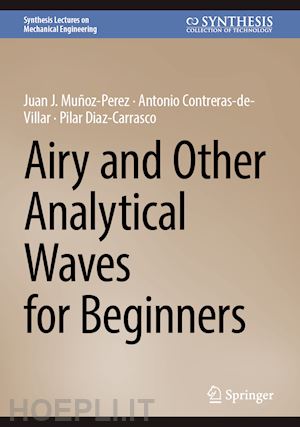

Questo prodotto usufruisce delle SPEDIZIONI GRATIS
selezionando l'opzione Corriere Veloce in fase di ordine.
Pagabile anche con Carta della cultura giovani e del merito, 18App Bonus Cultura e Carta del Docente
The aim of this book is to become something practical, providing a description of the essential theory (explained simply) and many solved exercises. The basic concepts necessary to understand the rudiments of the Airy wave and other analytical waves (and their application to Coastal Engineering) are clarified. Moreover, the appropriate mathematical tools are given in certain cases because some science courses do not require a minimum background in mathematics or physics. Despite not going into depth into the theoretical developments, experience has demonstrated that students are ensured to acquire the bare minimum of knowledge necessary to pursue any subsequent improvement course.
Basic Hydrodynamics.- Airy or small amplitude wave.- Other waves.
Juan J. Munoz-Perez has worked in private companies both in consulting and public works (CORSAN), as well as in the ports of Barcelona and Cadiz. As a civil servant, he has been Chief Engineer of the Projects and Works Service in the Atlantic Coastal Department (1989-2004) and Head of it (2009-2012), planning, supervising and directing about 400 maritime works. He is a Professor at the University of Cadiz, teaching subjects of Coastal Engineering, Submarine Emissaries, Hydraulic Works, Physical Modeling in Ports and Litoral Dynamics since 1991. He is also the author of numerous contributions in Congresses and articles in prestigious journals as a result of the projects he has managed through the Coastal Engineering research group (RNM-912) that he runs. The rest of papers can be consulted in his public profile (scholar.google.es/citations?user=xyE3rnoAAAAJ&hl=es).
Antonio Contreras de Villar has worked in a private company in the execution of public works (Dragados). He is currently a PhD professor in the Department of Industrial Engineering and Civil Engineering of the University of Cádiz, teaching subjects on Port and Coastal Engineering, Port-Coastal Interaction, Dynamics Litoral, as well as Physical Modeling in Ports since 2001. He belongs to the Coastal Engineering research group (RNM-912). He is the author of numerous articles in prestigious magazines, and you can consult his works in his public profile (scholar.google.es/citations?user=zeHyqTsAAAAJ&hl=es&oi=ao).
Pilar Díaz-Carrasco is currently Assistant Professor at University of Seville - Department of Construction Engineering and Engineering Projects. PhD in Civil Engineering funded by a predoctoral contract support for the University Teacher Training at University of Granada, Spain. She was the lead postdoctoral marine engineering expert at the University of Sherbrooke, Canada (2020-2022), leading and performing project tasks aimed at studying and modelling damage to marine structures as a consequence of coastal erosion due to Sea Level Rise. These models were relevant to simulate current conditions and erosion damage on the Canadian coast. After that, she was a postdoctoral researcher at the Polytechnic University of Valencia (2022-2023), leader in laboratory testing tasks and development of new ideas to generate a method for repairing structures and solutions with low environmental/economic impact. The main points of her research are (1) analysis of maritime structures from lab-experimentation and numerical modeling, (2) projection of future scenarios and solutions to sea level rise, and (3) seabed behavior around offshore structures. She is the author of numerous contributions in Congresses and Papers in prestigious journals. Her contributions can be consulted in her public profile (www.researchgate.net/profile/Pilar-Diaz-Carrasco).











Il sito utilizza cookie ed altri strumenti di tracciamento che raccolgono informazioni dal dispositivo dell’utente. Oltre ai cookie tecnici ed analitici aggregati, strettamente necessari per il funzionamento di questo sito web, previo consenso dell’utente possono essere installati cookie di profilazione e marketing e cookie dei social media. Cliccando su “Accetto tutti i cookie” saranno attivate tutte le categorie di cookie. Per accettare solo deterninate categorie di cookie, cliccare invece su “Impostazioni cookie”. Chiudendo il banner o continuando a navigare saranno installati solo cookie tecnici. Per maggiori dettagli, consultare la Cookie Policy.